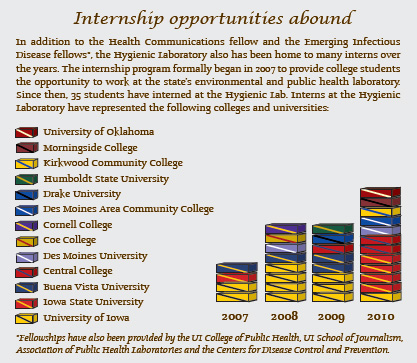
 |
|
It's all about the babies." Ask Stan Berberich, Ph.D., about the Hygienic Laboratory's Newborn and Maternal Screening program, and chances are he will share his mantra that reflects its core motivation. Three Iowa hospitals and the University of Iowa School of Journalism and Mass Communication (SJMC) are collaborating with the Hygienic Lab to develop a video intended to update hospital laboratory staff, nurses and phlebotomists on blood-spot collection techniques. The goal is to reduce the number of repeat blood collections and speed the screening process for all babies. The section Berberich heads provides the laboratory component for Iowa's Neonatal Metabolic Screening program. Each year the Ankeny-based team screens about 40,000 babies in Iowa for potentially life-threatening conditions. The Hygienic Laboratory also performs this vital service for the 9,000 babies born in North Dakota and the 12,000 in South Dakota. The numbers alone do not fully convey the importance of newborn screening. Detection and treatment of a medical condition shortly after birth can save a baby from irreversible neurological involvement, severe developmental delays or, in some cases, death. The small blood sample collected from newborns for screening is a first vital step in assuring the best possible start for babies. Erin O'Gara hopes that her recent work will contribute to a greater understanding of proper blood-spot collection in newborns, and reduce the need to collect a second set of blood drops. A Ph.D. candidate in the UI School of Journalism and Mass Communications, O'Gara was the first recipient of the Health Communications Fellowship, a joint project between the Laboratory and the SJMC. Berberich served as O'Gara's mentor for the fellowship. After interviewing hospital staff throughout the state and conducting two focus group sessions, O'Gara scripted and produced a video designed to update phlebotomists and pediatric nurses on specimen collecting and handling techniques. "I think the research we conducted and the resulting project have the potential to improve, and even save the lives of countless babies," O'Gara said. "It's wonderful being part of something like that."  Teaming with UI Marketing and Media Production, O'Gara captured footage of interviews with staff at St. Luke's Health System, Sioux City; Mercy Medical Center, Des Moines; and University of Iowa Hospitals and Clinics, Iowa City. The finished video will be posted on the Hygienic Laboratory website, the Baby's First Test website and other online venues for use by hospitals to update their staff. "I think the inter-departmental or inter-organizational fellowships are really underutilized, which is unfortunate because there are so many things that you can learn from going outside of your own area of academia," O'Gara said. "The practical experience that I gained from this fellowship and the opportunity to reach so many people is something that I could have never gained working anywhere else. "Fellowships benefit students in so many obvious ways, but they also strengthen the University's commitment to increasing knowledge and building bridges between departments."  |
